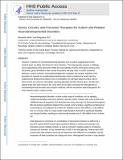Genes, circuits, and precision therapies for autism and related neurodevelopmental disorders
Author(s)
Sahin, Mustafa; Sur, Mriganka
DownloadSur_Genes, circuits.pdf (1.008Mb)
OPEN_ACCESS_POLICY
Open Access Policy
Creative Commons Attribution-Noncommercial-Share Alike
Terms of use
Metadata
Show full item recordAbstract
Research in the genetics of neurodevelopmental disorders such as autism suggests that several hundred genes are likely risk factors for these disorders. This heterogeneity presents a challenge and an opportunity at the same time. Although the exact identity of many of the genes remains to be discovered, genes identified to date encode proteins that play roles in certain conserved pathways: protein synthesis, transcriptional and epigenetic regulation, and synaptic signaling. The next generation of research in neurodevelopmental disorders must address the neural circuitry underlying the behavioral symptoms and comorbidities, the cell types playing critical roles in these circuits, and common intercellular signaling pathways that link diverse genes. Results from clinical trials have been mixed so far. Only when we can leverage the heterogeneity of neurodevelopmental disorders into precision medicine will the mechanism-based therapeutics for these disorders start to unlock success.
Date issued
2016-07-20Department
Massachusetts Institute of Technology. Department of Brain and Cognitive Sciences; Picower Institute for Learning and MemoryJournal
Science
Publisher
American Association for the Advancement of Science (AAAS)
Citation
Sahin, Mustafa, and Mriganka Sur. “Genes, Circuits, and Precision Therapies for Autism and Related Neurodevelopmental Disorders.” Science 350, no. 6263 (October 15, 2015): aab3897–aab3897.
Version: Author's final manuscript
ISSN
0036-8075
1095-9203